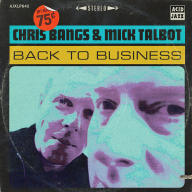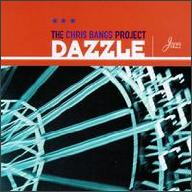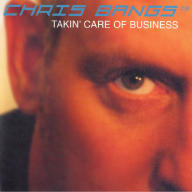He was born in Kingston-upon-Thames, on the fringe of southwest London in 1958 and ultimately attended a local grammar school. While there, Bangs became obsessed with prog rock -- particularly a local act, Pink Fairies -- which inspired him to learn guitar and start a band. After moving away to college, a flatmate introduced him to jazz and soul with Miles Davis' On the Corner and Stevie Wonder's Talking Book among Bangs' early favorites. Unable to reproduce the sound in his head on guitar, he discarded the instrument, instead putting all his effort into DJ'ing. He was soon playing five nights a week, often sleeping in his van among boxes of records. Eventually, he crossed paths with Peterson and they began playing sets together, sometimes at Nicky Holloway's nights where different tastes were usually catered to in separate rooms. However, on one such west London night in 1987, the DJs were all required to play to the same room of 1,000 people. Bangs and Peterson immediately followed Paul Oakenfold's acid house set, and with Oakenfold's trippy visuals still on the screen behind them as they played their opening record, Bangs is reputed to have shouted into the microphone: "If that was acid house, this is acid jazz!"
Acid Jazz Records' third single was 1988's "Psychedelic Jack" by Extasis, the first of many recording pseudonyms used by Bangs. Others include the Quiet Boys, Johnny Dayglo, and Bangs-A-Bongo, all of which were used on the 1989 album Hippy House Happy Hop. High-profile production work came his way on sessions for Galliano's 1991 debut LP, In Pursuit of the 13th Note. He also produced "Above the Clouds" for Paul Weller's 1992 eponymous solo debut, and in subsequent years he produced for Joëlle Ursull, Espiritu, and Anthea. The mid-'90s brought a trip-hop influence to his own projects, particularly on material he released as Mr. Electric Triangle on 2 Kool, and his collaborative work with Anthea Clarke as the 13th Sign. In a spurt of productivity, between 1996 and 2000, he teamed up with ex-Style Council keyboardist Mick Talbot to create seven albums of smooth, beats-driven jazz: four under the name Soundscape UK and three as the more streetwise Yada Yada.
In 1999, Bangs issued Takin' Care of Business, the first proper solo album under his own name, and this led to a Sony single -- "Warm Weather" featuring Rita Campbell on vocals -- gracing the lower reaches of the U.K. chart. In 2000, he formed the Dadhouse label with Dave Jarvis, primarily as a platform on which to release numerous jazzy house singles under the Original Soulboy moniker. These were interspersed with progressive house singles in collaboration with Terry Farley on Junior London -- under such monikers as the Path and Spirit of the Boogie -- preceding that pair's 2003 remix of Trieste's "Too High in the Sky." Subsequently, Bangs became increasingly focused on creating music commissioned for film, TV, and adverts.
In 2008, Acid Jazz issued Fuck Acid House This Is Acid Jazz, a partial retrospective/partial new album of Bangs' work, as he kept a low profile over the next decade, writing, arranging, and producing for other artists. As the 2020s approached, the licensing of Soundscape UK's and Yada Yada's work for digital release provided a modest cash windfall, and Bangs suggested that he and Talbot use the money to fund another album. This resulted in the organ-fueled, '60s-inspired Back to Business, issued on Acid Jazz in 2022 following Bangs emigration to the suburbs of Marbella, Spain.
The following year, he allowed the Latin influence -- past and present, due to his new surroundings -- free rein on Firebird. The Acid Jazz-released volume offered a unique spin on jazz DJ'ing, producing an album that reflected the U.K. dance scene's classic '80s era. Across ten tunes, the album presented a jazz-drenched smorgasbord of bossa, fusion, hard bop, jazz-funk, salsa, and more. Its title track was selected Jazz FM's Breakfast Show as "track of the week." ~ James Wilkinson, Rovi















